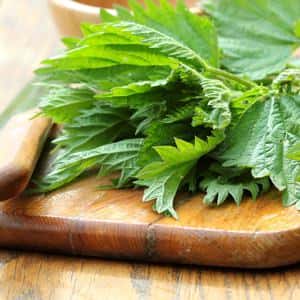
Allergy season may differ depending on geography and what plants grow in the area. Seasonal allergy symptoms usually trouble people most during autumn or spring seasons. Many people use antihistamines to control their sneezing, congestion and irritated eyes. Some find that cromolyn prevents suffering. Still others prefer herbal remedies such a stinging nettles. Here are a few testimonials.
Stinging Nettles Changed Reader’s Life:
Q. Stinging nettles changed my life! I use them for my seasonal allergies. All fall, I drink a cup a day of a homemade infusion. (To make it, bring nettles to a boil, turn off and leave to sit 8-10 hours). I no longer suffer from allergies and better than that, I no longer get severe respiratory infections.
A. The scientific name for stinging nettle is Urtica dioica. It has been used in Europe to calm allergic reactions for a long time. Scientists have determined tht it has potent anti-inflammatory activity (Recent Patents in Inflammation & Allergy Dug Discovery, 2018)
For people who may not be familiar with this plant (which can indeed sting when harvested), freeze-dried formulations are available in health food stores. Side effects may include stomach upset, which is why this supplement should be taken with food. This herb can also interact with several medications so please ask your doctor before adding it to a medication regimen.
Use Stinging Nettles Leaf and Root Extracts Differently:
Q. A friend found a mention of nettle leaf for allergy relief on your site and passed it along. It works wonderfully.
It has also worked for others. A student in one of my college classes told me that he was unable to sleep the night before because of allergy. He took a dose of my nettle leaf extract. An hour later he interrupted the class to say his symptoms were gone.
On your Web pages you discuss nettle root for prostate health. Are the uses of the leaf and the root different?
A. Stinging nettle (Urtica dioica) is a common herb in Europe, where the leaves may also be eaten as a vegetable. In this country, few people know about it.
You are correct that the nettle root extract is used to treat symptoms of enlarged prostate. The above-ground parts are used to treat symptoms of allergy (Alternative Medicine Review, Sept. 2007).
Tasty Edible Wild Herbs:
Q. I was intrigued to read that stinging nettle can be used for allergies and enlarged prostate. I do not suffer from those conditions, but years ago we carefully picked wild stinging nettles with clippers, dropping the nettles into a large paper sack. Once home, we dumped them into a sink full of cold water and then cooked them. Believe me, they tasted much better than spinach!
A. When stinging nettles contact the skin, their tiny hairs cause acute pain, redness and irritation. For many centuries people have eaten nettles as a vegetable as well as using them for medicine. Once cooked, they no longer sting and people find them very tasty. Stinging nettles are also used to treat arthritis, bladder infections and kidney stones.
Citations
- Yatoo MI et al, "Anti-Inflammatory drugs and herbs with special emphasis on herbal medicines for countering inflammatory diseases and disorders - A review." Recent Patents in Inflammation & Allergy Dug Discovery, 2018. DOI: 10.2174/1872213X12666180115153635

